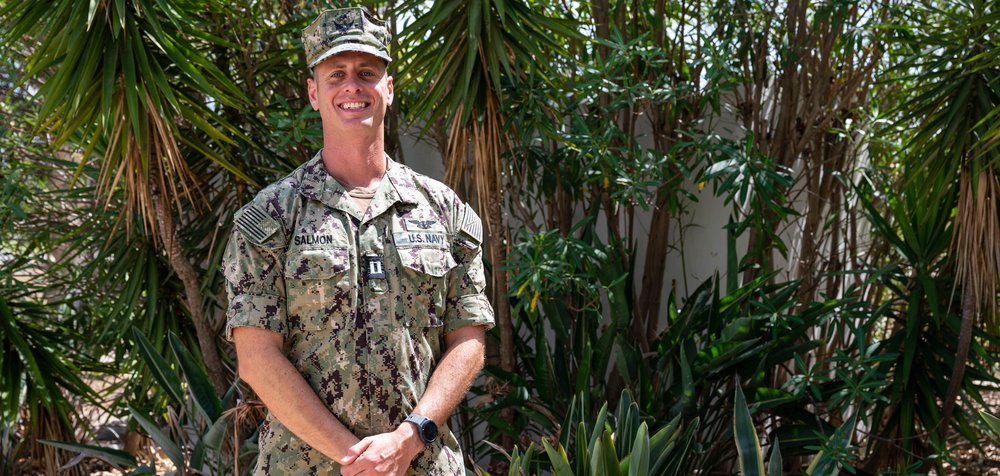For a victim of sexual assault, finding someone to trust and guide them through the complex maze of medical, legal, and administrative systems can be overwhelming. This is where the Victims’ Legal Counsel (VLC) can help take some of the burden by advising and advocating for the victim.
“As the VLC, we understand the processes, and by talking with the client and understanding their end goal, we know the pathway to get there,” said Lt. Christopher Salmon, JAGC, USN, the VLC for Naval Station (NAVSTA) Rota. “It can be really hard for a client to get the goal they want by themselves because the system is complex – that’s the advocacy part.”
According to their website, “The Navy Victims’ Legal Counsel Program provides survivors of a sexual offense or domestic violence with a dedicated attorney to help victims understand the investigation and military justice process, guard their legal rights and interests, and obtain additional support in accessing resources that may assist in their recovery.”
For Salmon, the Navy’s VLC program is close to his heart. He enlisted in the Navy in 2006 as an aviation electrician’s mate. It was a friend’s assault and attempted suicide that made him want to become a lawyer. During that time, the VLC program did not exist and there were limited personnel available to advocate for victims of sexual assault within the Navy.
In 2013, Salmon heard of a newly created Navy Judge Advocate General’s (JAG) Corps commissioning program. The JAG Corps In-Service Procurement Program sends enlisted Sailors to law school to earn their Juris Doctor, gain admission to practice law, and commission as a Navy Judge Advocate. He immediately applied because he wanted to explain the complex military justice process, empower and advocate for victims by giving them the resources to have their voices heard. Something that he feels would have made all the difference in his friend’s situation.
“If VLCs would’ve existed at that point, I don’t think my friend would have felt so failed by the Navy,” he said. “Because at a bare minimum someone would’ve been able to explain to her the legal process and ensure that the process was followed. Even better, they could have advocated on their behalf.”
Since becoming a military lawyer, he has served as judge advocate in Yokosuka, Japan as a defense counsel, legal assistance attorney, and as a staff judge advocate (SJA) advising numerous commanders. Afterwards, he was the SJA at Naval Medical Center San Diego (Balboa), California, advising leadership on a broad range of topics.
“I dealt with a lot of complex and difficult cases at Balboa,” he said. “Everyone from the Pacific AOR [area of responsibility] with severe medical issues is medievac’d and becomes attached to the medical center. That job required navigating a lot of complex medical and disciplinary issues as well as a large victim case load.”
His military and SJA background have primed Salmon for this new position.
“The first five jobs on my list were VLC because I knew at this time in my career, this was exactly what I wanted to do,” he said. “Getting back into the personal representation, getting back overseas, my background at the hospital, being prior enlisted, and as a uniform victim advocate make me uniquely skilled for this position as a VLC.”
As a VLC, Salmon must be well-connected and knowledgeable. Overseen by their headquarters in Washington, D.C., the VLC works independently from local units to counsel victims. They also work closely with Sexual Assault and Response Coordinator (SARC), U.S. Naval Hospital Rota, Family Advocacy Program (FAP), and Navy Criminal Investigative Services (NCIS). VLC, however, have a completely independent chain of command who reports directly to Commander, Naval Legal Services Command a Rear Admiral Judge Advocate.
Recently the Navy’s VLC program celebrated its 10th anniversary, and it continues to adapt to best fit the needs of victims. In its infancy, the program relied heavily on naval reservists, who were primarily prosecutors in their civilian life. Over time, the program has grown to include a mix of prosecutors and staff judge advocates to better support victims.
“The program intentionally balances regions with people who have the specialized expertise to handle all cases,” explained Salmon, who falls within the staff judge advocate/legal counsel side. “For complex courts-martial issues, I’ll contact Sigonella’s VLC who was a prosecutor before this tour, and they will ask me about complex SJA-type questions.”
The VLC program has added support for victims of domestic violence in the past year, and there will be more changes as the program continues to evolve.
“I really like working with people and advocating on their behalf,” said Salmon. “Being able to help as we’re growing the policy and adding different ways that victim’s voices can be heard in that process is important to me.”
While not everyone in every situation may be eligible for VLC assistance, Salmon encourages anyone who needs help to seek it.
“We’re an expansive program so if you’re not sure if you qualify, come talk to me and I will see what I can do,” said Salmon. “If I can’t help or I’m not the right fit, I know tons of other attorneys employed by the Navy that you can talk to for free to get help on the issue.”
If you or someone you know needs to contact the VLC, call DSN 727-1711, commercial, +34 956-82-1711, or stop by their office on the first floor of Bldg. 3293. Rota VLC provides support and services to active duty, dependent, and U.S. civilian sexual assault and domestic violence victims primarily in Spain, Portugal, and the United Kingdom.
